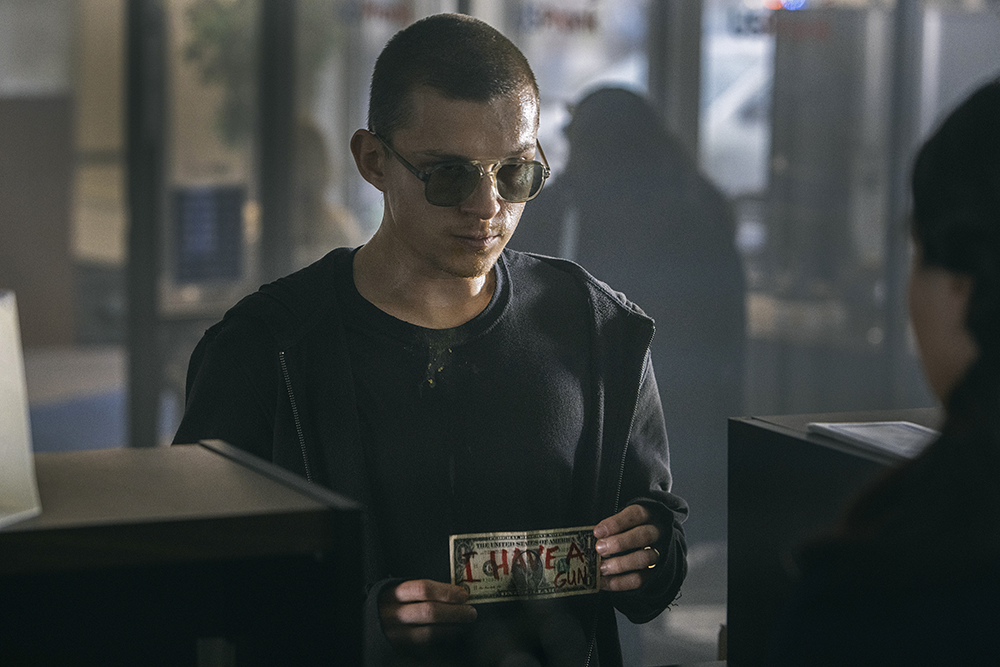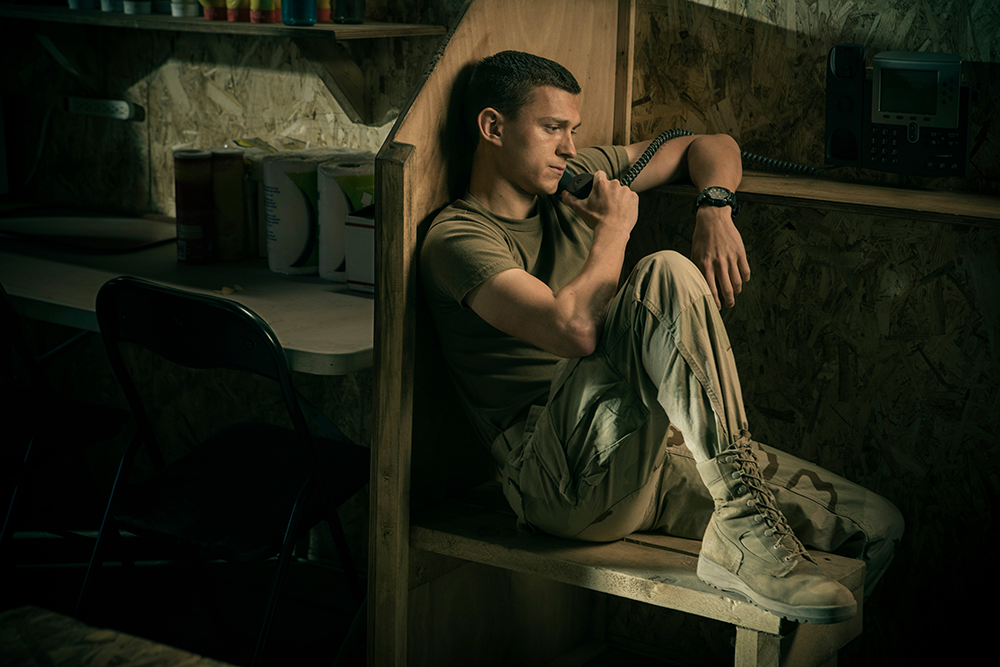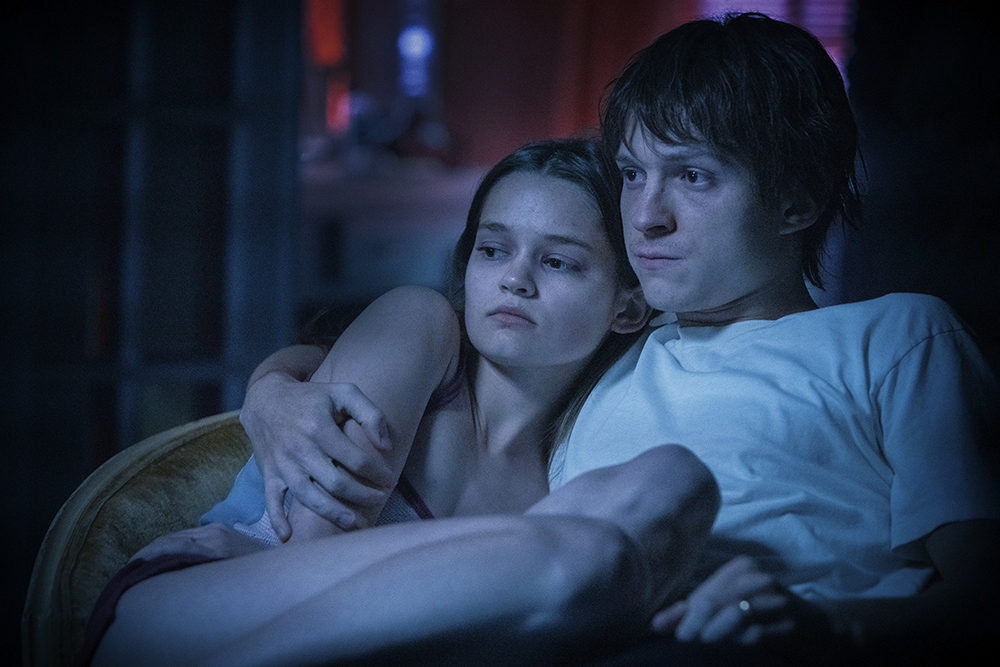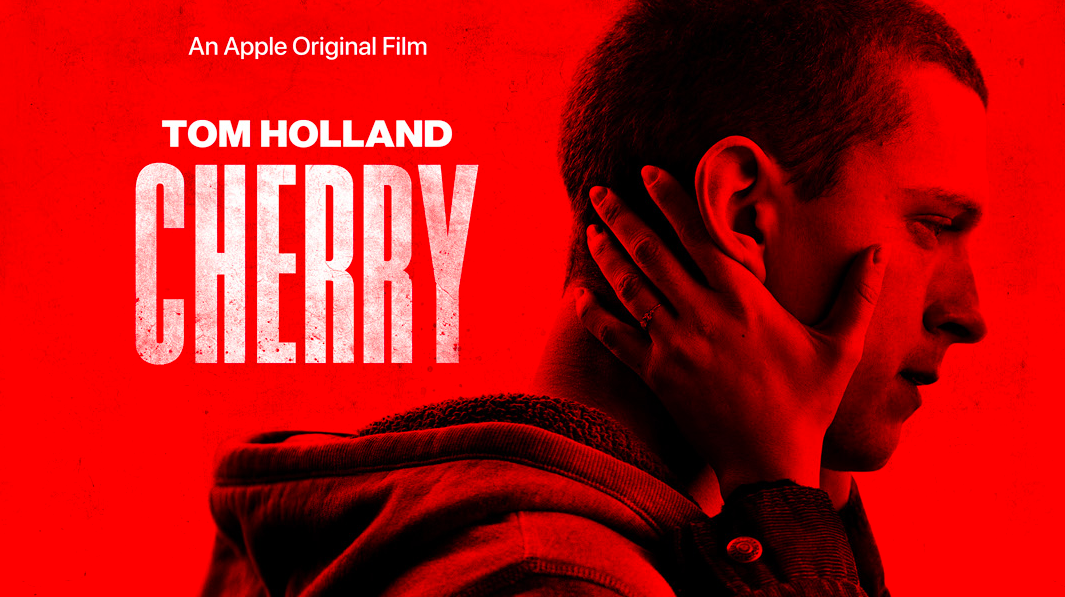There’s a lot to take in with Anthony and Joe Russo‘s most recent flick, Cherry. Reunited with Tom Holland after Avengers: Infinity War and Avengers: Endgame comes a war story of a different sort. Based on a novel, which is semi-autobiographically based on the life of Nico Walker, an Iraq veteran-turned-drug-addict-turned-bank-robber, there’s a lot to unpack. Cherry, the novel, was inspired by a Buzzfeed profile of Walker from 2013. An editor reached out to Walker, who was then serving his time in a Kentucky federal prison, and sent him books, eventually suggesting that he write a book.
Going into these types of films, I like to read the book that inspired the film after watching the movie. In a story as personal as Cherry, it felt extra important to see the read the source material. But does Cherry, the film, match up to the original story back in 2013? There are some scenes that have survived from the drafts of the novel to the creation of the screenplay for the film, some that have been edited away, and some that have been added.
The reality is, very little needed to be added to Cherry and the additional scenes, like the narrator’s undying loyalty to Emily (Ciara Bravo), adds a layer of melodrama that detracts from the film rather than add to it. Coming in at 141 minutes, the film can feel bloated at times. Granted, the Russos have a lot of ground to cover. Cherry touches on topics like toxic masculinity, verbal and mental abuse, combat trauma, severe ptsd, depression, disillusionment, the opioid crisis, and even nihilism.

But it’s all touched upon. Much like the novel, there is very little self examination when it comes to the narrator, at least none of it makes it on-screen. We are presented with issue after issue and are forced to self-diagnose. In this manner, the film emulates the novel. It shows you everything and you’re left to make your own conclusions. Rarely does the narrator tell you just how he feels, or why he does the things that he does? There are small hints to his disillusionment in the world around him, like when he talks to the faceless bank teller, robs banks called Bank Fucks America and Credit None, or sees Dr. Whomever for help with his PTS and is given a prescription for Oxycontin. And fittingly within the narrative, there is very little professional help given to him despite the fact that we, as the audience, know that he suffers from post-traumatic stress.
Divided into seven parts, a prologue and epilogue with five parts in between, the most dynamic part is undeniably Part Three, titled “Cherry”. After meeting the love of his life, Emily, the narrator enlists in the army in 2003. He passes basic training and he is thrown straight into the deep end during the most volatile and violent years of the occupation of Iraq, placed right in the “Triangle of Death.” From humorous moments of camaraderie between the narrator and his fellow soldiers to crushingly brutal attacks leaving him putting the charred remains of his comrades into black bags, the Russos excel at displaying the horrors of war without glamorizing or exploiting it.
Even cutting out some of the more gruesome scenes from the novel, this is the strongest part of the film. It solidifies as a watershed moment in the narrator’s life. The essential soul of the character is not completely lost, there are moments of softness in the narrator that is played out expertly in Holland’s performance, both fragile and strong. He can embody both sides of the narrator, the smart-mouthed soldier mouthing off to a sergeant, and the empathetic medic who sincerely wants to help even when faced with opposition in the way.

After coming home, he faces severe disillusionment. Add that to the trauma he experienced in combat, and the insomnia and nightmares it leads to, and the narrator quickly develops an addiction problem. This is perhaps a more gradual process in the novel, where we learn that most of the soldiers are doing anything to get high even while deployed. The narrator soon goes from pills to Oxycontin and then finally to heroin. And how can he support this expensive habit? (In the novel, he and Emily spend nearly a thousand dollars a week at the height of their addiction.) He starts robbing banks.
While this is another strong part of the film, with the Russos capturing both the absurd moments of being embroiled in the drug underworld and also the disastrous addiction associated with being a dope fiend, this part of the film stretches on. It lacks the same tempo and rhythm as its earlier parts and that’s where it falters. Similarly, and this is perhaps a commentary also on the novel, but Walker makes it clear in his 2013 profile that much of his motivation for robbing banks was in the rush. In the article, Scott Johnson writes, “In that way, a bank robbery was a lot like the war: The worse things got, the easier it was somehow to cope.” Yes, the money was an added bonus, but it’s hardly the act of desperation the narrator claims.
And that’s perhaps the core of the problem with Cherry. It should have pulled both from Walker’s own real-life experiences and trimmed the fat off of some of the more melodramatic moments of the novel. It doubles down on the narrator’s romance with Emily — thankfully cutting out the rampant sexism evident in the novel — but combined with the unconvincing dialogue and a lack of chemistry, it drags the movie down and holds it back. We’re told to believe that this is a romance for the ages, one that overcomes all, but it often feels contrived. I didn’t know why these two people chose to remain with one another when their romance seemed to be the easiest habit to break.

But the best parts of the film are the ones that feel the most authentic, those pulled directly from Walker’s life and lacks any form of pretension. Holland dives into the role, we’ve already seen him shed the sunny Peter Parker he is famous for before, but this performance watches the actor give it his all. Mixing softness with desperation and repression, he doesn’t backdown from the challenge of taking on a character that cycles through very different phases of his own life. On top of the Russos’ perfectly capturing the frenzy and chaos of war, Henry Jackman offers a score that highlights the emotion and movement of a scene perfectly. From tenderness to violence, his score frames the scenes delicately.
The film ends with a tinge of hope and perhaps some optimism. After a grim and hopeless film, this is less fitting. In a story that leaned into the realities of so many dark episodes in the narrator’s life, perhaps this was the opportunity to inject a bit of levity. It’s not the strongest ending, but there are enough powerful parts in the film to keep Cherry afloat. While I think that the Russos could have benefitted from adapting more of Walker’s own real-life, Cherry is a valiant and bold effort in balancing a war story with an addiction story.
Cherry will premiere in select theaters today, on February 26, 2021 and globally on Apple TV+ on Friday, March 12, 2021.





![INTERVIEW: Cynthy Wu on FOR ALL MANKIND & being the first [SPOILER] on Mars For All Mankind - Cynthy Wu](https://www.comicsbeat.com/wp-content/uploads/2022/07/for-all-mankind-cynthy-wu-feat-218x150.jpg)



